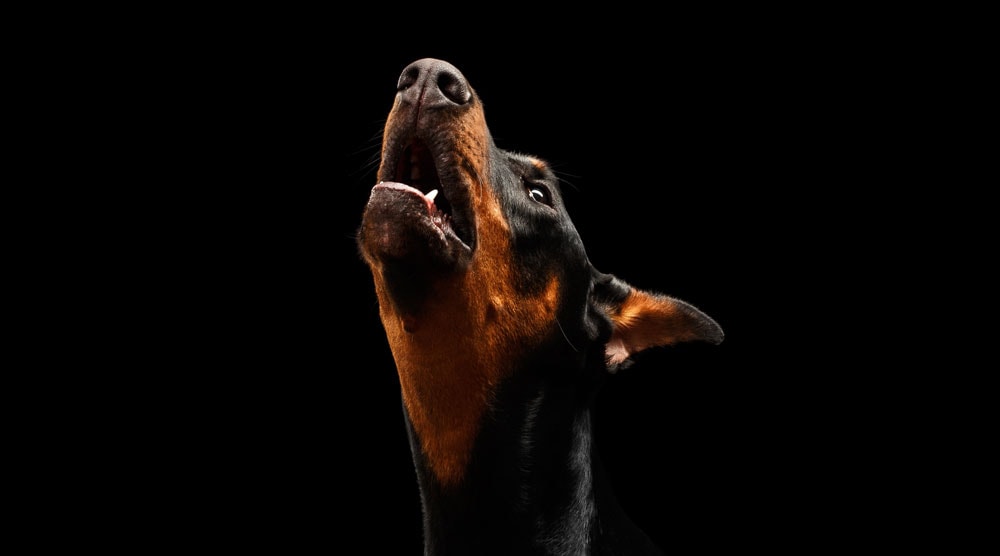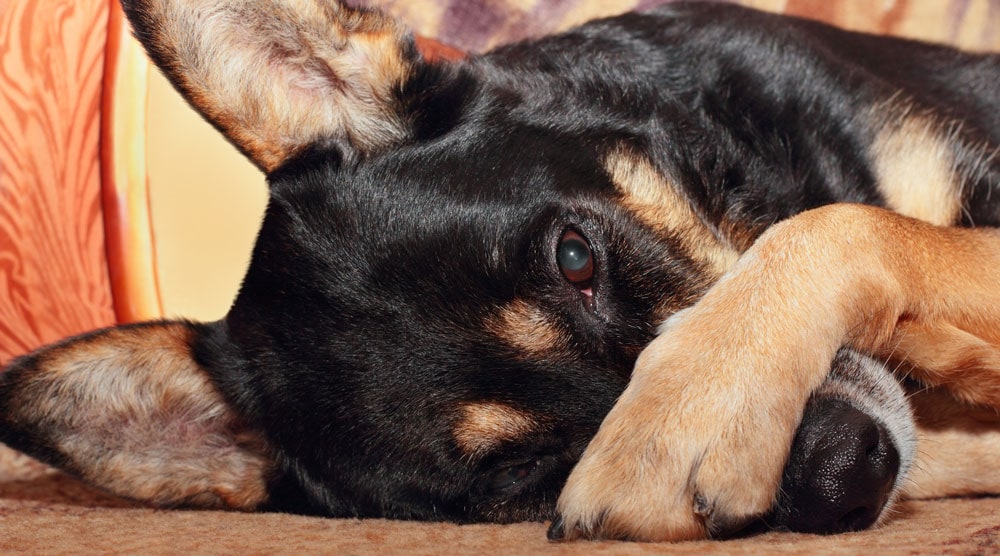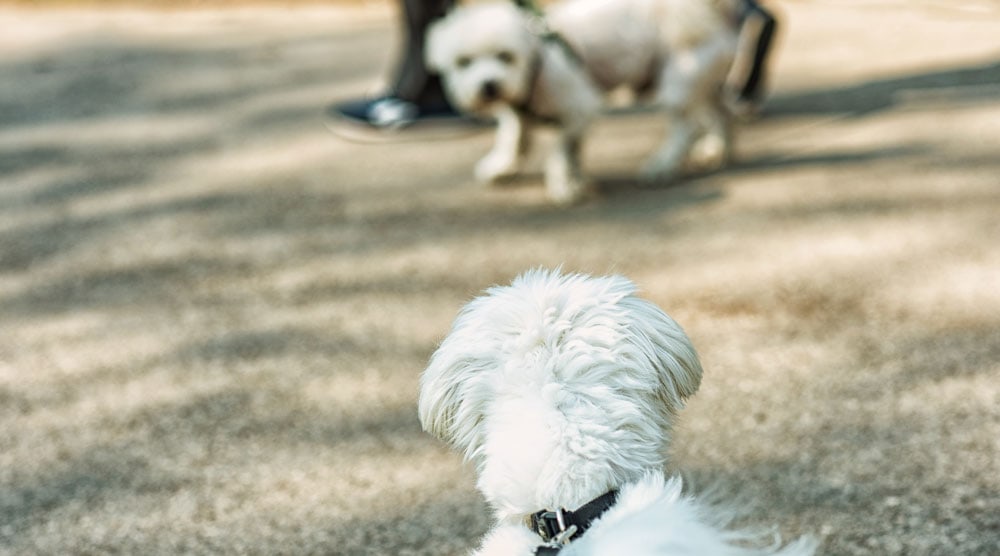Key Takeaways
- Dogs howl at night for many reasons, including separation anxiety, pain, illness, responding to another dog or animal, and responding to noises.
- Howling at night is unlikely to be a form of attention-seeking. Instead, it’s almost always the dog showing distress, communicating, or showing that a need isn’t being met.
- The key to preventing or reducing howling at night is to address the underlying issue. Never punish or scold your dog for howling at night.
A dog howling at night is both worrying and frustrating. Even small dogs can howl surprisingly loudly – and it’s not always obvious why the behavior is happening.
While howling at night can be confusing, your dog is trying to tell you something – the key is to uncover the reason. “We tend to separate howling from barking because it sounds so different,” says IMDT dog trainer Rebecca Morello. “But howling is just another way a dog vocalizes to communicate.”
Let’s take a closer look at why dogs howl at night and the most common night-time triggers. We’ll also talk about why dogs howl in the first place, how to reduce it, and some superstitions about this behavior.
Contents
Why Do Dogs Howl At Night?
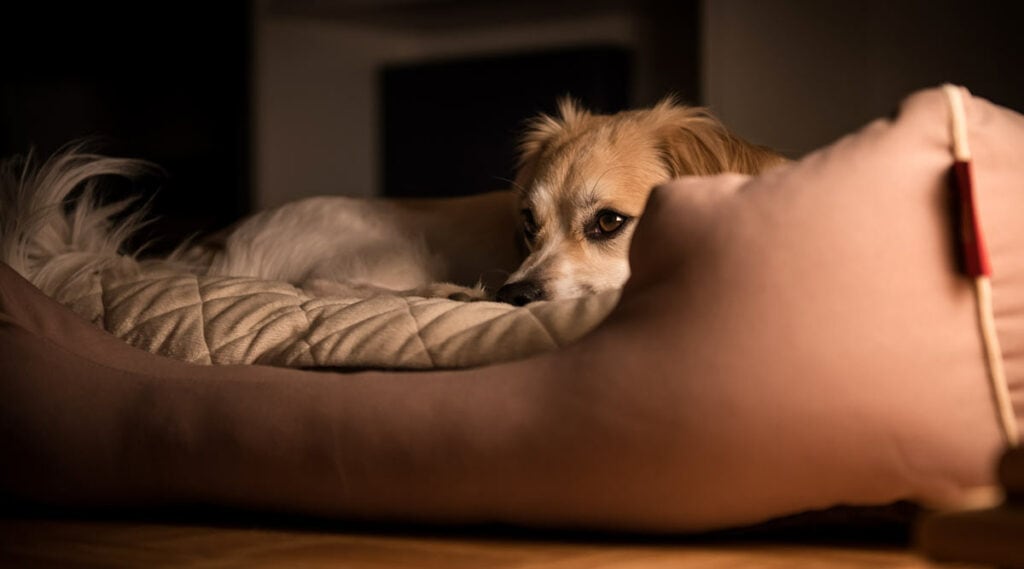
1. Separation Anxiety
One of the most common reasons for howling at night is anxiety at being left alone. Your dog’s howling is a way of calling you back and letting you know where to find them.
This form of howling is more common in puppies – especially when spending their first few nights alone – but can become a problem at any age.
Not all night howling is separation anxiety though. Separation anxiety will cause other symptoms, such as pacing, toilet accidents, barking, destructive behavior, and whining. A dog with separation anxiety will also usually suffer whenever they are left alone.
If your dog is suffering from separation anxiety, you should consult with a positive training expert and your vet. They can help you develop a plan for reducing your pet’s anxiety at being left alone.
Most importantly, never scold your dog for behaviors caused by anxiety – including howling. They are not being “naughty” or disobedient. It’s just a way of coping with the intense and unpleasant feelings they are experiencing.
2. Pain or Illness
Dogs sometimes howl because they are in pain or feel unwell. They may also whine, bark, or yelp more often than usual.
For this reason, you should always take your dog to a vet if they start howling more often. Dogs are experts at hiding discomfort, so any potential sign of illness should be investigated as soon as possible.
Older dogs with dulled senses may also howl more often. Aside from pain, the dog might feel confused – particularly in the dark. A change in behavior can also be a sign of canine dementia.
3. Responding to Another Dog or Animal
If another dog is howling nearby, your dog may respond with a howl of his own. Some dogs even respond to coyote calls. This is particularly common at night, when there’s less background noise.
Remember, a dog’s hearing is up to four times better than yours. Just because you can’t hear a reason for the howling doesn’t mean it isn’t there.
Tip: White noise can be a great way to cover up noises at night.
4. Responding to Other Noises
Some dogs howl at strange noises, such as emergency vehicle sirens or car horns.
While this might be a minor issue in a quiet village, it can be a nightmare if you live in a city!
The best way to prevent howling at a specific noise is by desensitizing your dog to it. Here’s the basic process:
- Download an audio clip of the same sound. This allows you to control when the sound plays and how loud it is.
- Start playing the sound at a low level that doesn’t cause a reaction. Remember, your dog’s hearing is much better than yours.
- Create positive associations with the sound. When the sound starts, play a game with your dog or give a treat. The goal is to create happy associations with the noise – or at least to get your dog to focus on something else.
- Gradually increase the noise level. The key word here is gradually. Desensitizing can take a long time, so take it slowly and don’t rush your dog. If you notice your dog is getting stressed, stop the session and lower the sound level next time.
- When your dog is comfortable with the noise, practice in different rooms. You want your dog to feel happy when he hears the noise in any location.
Do Dogs Howl for Attention at Night?
In the vast majority of cases, howling at night is due to one of the reasons above – anxiety, pain, responding to another animal, responding to other noises, or some other need that’s not being met.
While it’s possible that howling is a way to get your attention, this isn’t a commonly seen behavior in dogs. So, you shouldn’t assume that your dog’s howling is just because they want to play or get attention.
“Barking is more common as a way to get attention, such as if the dog wants a ball, treat, or for you to open a door,” says Morello. “But howling is very unlikely.”

Resolving Night Howling: A Trainer’s Story
“During the 2021 lockdowns, it was harder to help my clients because I wasn’t able to properly see their home and setup.”
“In one case, I had been working with a puppy for several weeks. They were comfortable and happy in their crate, fully toilet trained, and had previously been sleeping through the night. But suddenly, the puppy started howling in the middle of the night.”
“The owners had tried to fix the issue, but the puppy didn’t need the toilet when let outside and wasn’t showing signs of separation anxiety.”
“After some detective work and asking lots of questions about the environment, I discovered the crate was next to the garden door. The puppy was getting cold as winter was coming!”
“After purchasing a jumper, providing extra blankets, and placing a hot water bottle inside the crate, the puppy stopped howling and slept through the nights again. Remember your dog is always trying to tell you something!” – Rebecca Morello, IMDT-accredited dog trainer
Why Do Dogs Howl?
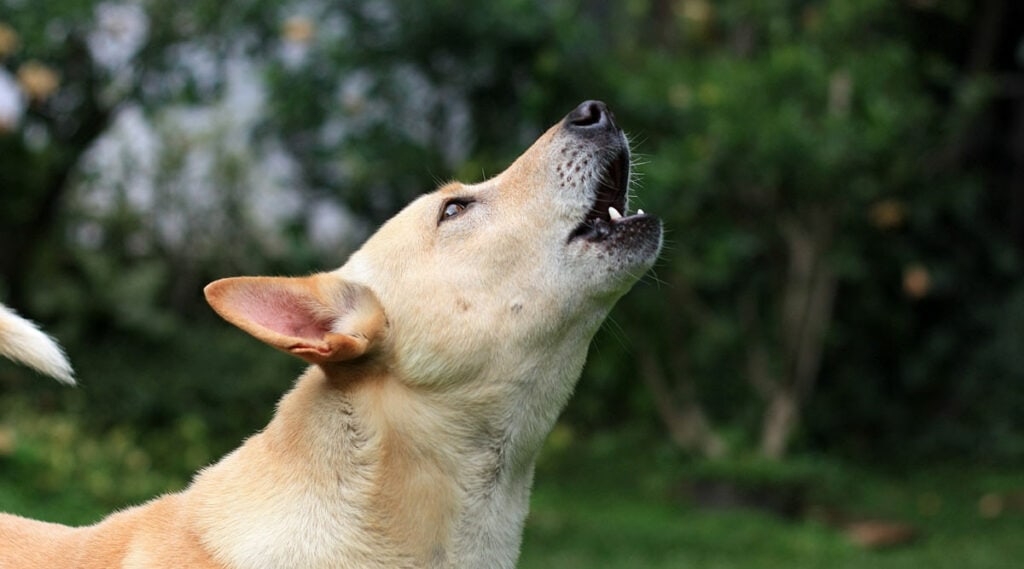
Now we’ve discussed why dogs howl at night, you might be interested in learning about why dogs howl at all. To understand this behavior, we need to discuss the domestic dog’s ancestor: the wolf.
Wolves Howl as a Reaction to Loneliness
Wolves are pack animals. They thrive in groups, but struggle alone. Of course, domesticated dogs are no longer wolves, but have become social animals who thrive on companionship with humans. Even so, as dogs descended from wolves, some behaviors remain.
In the wild, it’s essential for a wolf to be able to communicate its position to others – often across great distances. Howling is perfect for this, as the long, high-pitched note carries much further than a bark or whine.
When a wolf is separated from the pack, it howls to indicate its location. Wolves also howl to call in stragglers and find lost pack members.
In other words, howling is a reaction to loneliness. Keep this in mind when we start talking about your dog’s behavior.
Wolves also howl if another pack has entered their territory. Again, howling is designed to reveal their location, but the goal is now to warn others to leave.
Note: If you’ve never heard a wolf howl before, here are some great examples (use headphones if your pup is nearby!):
Dogs Howl for Similar Reasons – With a Few Additions
We always need to be careful when applying wolf psychology to domesticated dogs. The two share a common ancestor, but there are major differences in appearance and behavior.
With that said, the most common reasons for a dog to howl are to communicate distress, as a call to other dogs or humans, and announce their presence.
“Howls usually indicate the dog is in some kind of distress, such as anxiety at being alone or concern about an intruder,” says Rebecca Morello, IMDT dog trainer. “This makes sense when we think of what a howl sounds like – loud, long, and high in pitch, meaning that someone will hear them.”
In addition, some dogs howl at loud noises, such as singing, musical instruments, and emergency vehicle sirens. Researchers aren’t sure why this happens, but it could be that the dog just enjoys joining in. It may also be a territorial “go away” – at least in the case of emergency sirens.
“Some dogs howl because they are enjoying themselves or it is a normal part of their behavior, such as Huskies greeting each other or their humans,” says Morello. “The best way to understand whether your dog is howling due to anxiety is by looking at context and body language.” She adds that you should watch for other signs of stress and anxiety, and contact a canine behaviorist if you’re unsure.

Do All Dogs Howl?
All dogs can howl, but certain breeds are much more likely to do it.
Sled dogs, for example, are often kept in groups, so they’ve retained a stronger instinct to howl as a form of communication. Hounds that have been bred for hunting also tend to howl more often, as they use this noise to signal an animal is trapped.
Some examples of dogs that love howling include:
- Siberian Husky
- Malamute
- Bloodhound
- Beagles
- Dachshunds
A Word About Superstitions
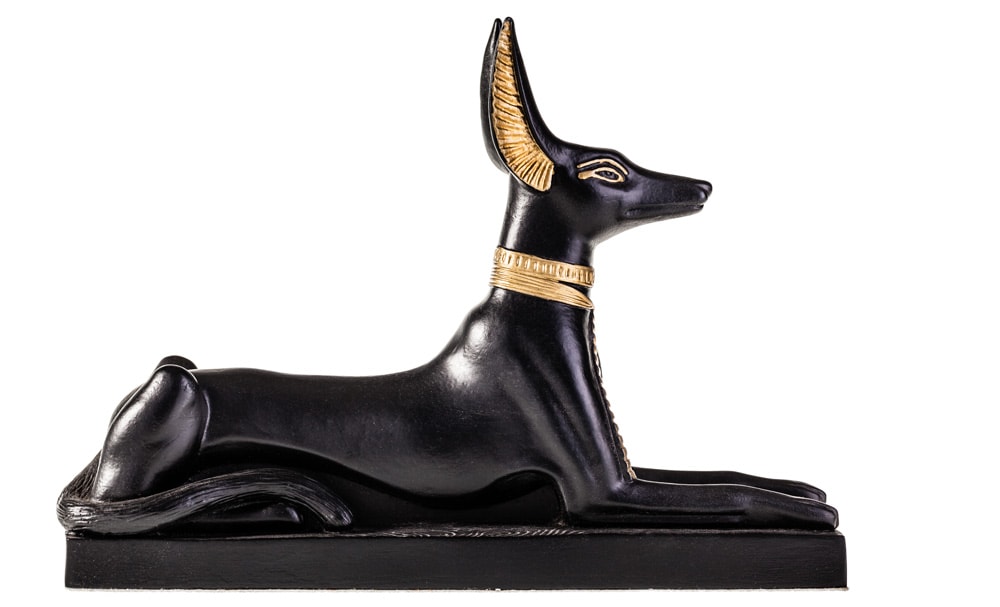
At The Dog Clinic, we try to focus on evidence-based explanations for canine behavior. But this article wouldn’t be complete without mentioning the many superstitions associated with howling.
The most common superstition is that a howling dog signals an impending death. The internet is filled with stories of dogs randomly howling, only for an unfortunate soul to be found dead soon after.
It’s believed this superstition can be traced back to Ancient Egypt. Anubis, the God of death, was represented with a canine head. Howling dogs were thought to be calling to him.
Many other cultures have held similar beliefs though. There are Irish, Norse, Welsh and American beliefs that link howling to death, and modern films have reinforced this connection.
While there are lots of compelling stories about dogs predicting tragic events, the reality is that they are probably a form of selective bias.
Humans tend to remember things that confirm their beliefs and ignore those that don’t. A dog howling without a related death is quickly forgotten, but if someone was to die – even a few days later – the event is likely to stick in the memory.
So, despite the many superstitions around howling, one of the other reasons above is probably the true cause!
Summary
The simple answer is that dogs howl at night to communicate. So, the key to preventing howling is to understand what your pet is communicating and why.
To quickly summarize this article, the most common reasons for a dog howling at night are:
- Your dog is suffering from separation anxiety and is trying to call you to him.
- Your dog is suffering from pain or illness.
- Your dog is trying to respond to another dog or animal (which you may not be able to hear).
- Your dog is responding to other noises, such as emergency vehicle sirens or fireworks.
Do you have any questions related to why dogs howl at night? Let us know in the comments section below! You may also want to read our guide to why dogs bark at nothing.
